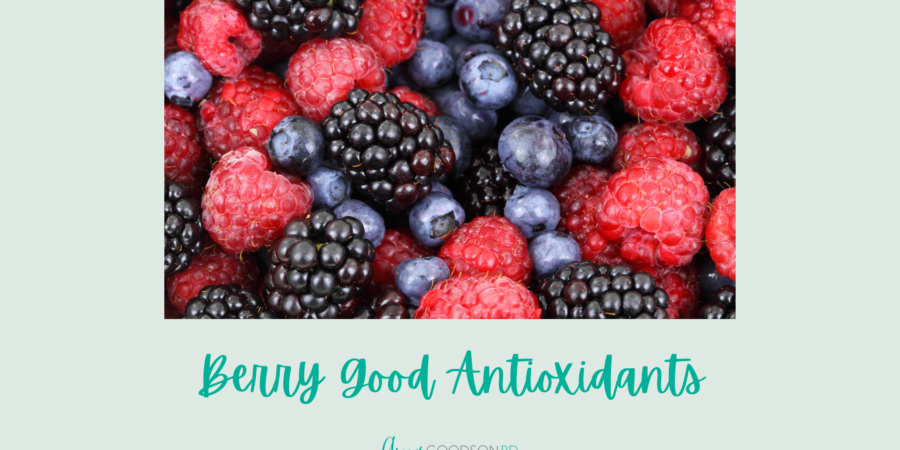Did you know that July is National Berries Month? This means it’s the perfect time to talk all about the antioxidant powers of berries! There is some research that shows that blueberries, raspberries, and blackberries have some of the highest antioxidant activities of commonly consumed fruits. We always hear about certain foods being an “antioxidant powerhouse”, but what does that actually mean?
First, let’s get down to the basics of what antioxidants actually are. To put it simply, antioxidants are molecules that help prevent disease by fighting off free radicals. Free radicals are compounds that can cause harm to us if they build up in our bodies (basically bad guys that can cause damage to our cells), and excess levels of free radicals have been linked to increased risk for chronic diseases. So, think of antioxidants as little soldiers in our bodies that help to protect our tissues from damage!
There are thousands of types of antioxidants, including vitamin C, vitamin E, and compounds we call flavonoids (which are present in many fruits and veggies, as well as wine, tea and chocolate!). Did you know that one cup of blueberries alone is estimated to have over 13,000 antioxidants? Let’s break down some of the common antioxidants found in berries!
Vitamin A
Vitamin A is a fat-soluble vitamin that is important for eye and vision health, immune function, reproduction, and growth and development. Vitamin A may also reduce your risk for certain cancers, such as lung and prostate cancer. Alpha-carotene, a form of Vitamin A that includes lutein and zeaxanthin, has been associated with improvements in learning, memory, and attention.
Vitamin C
Vitamin C, unlike vitamin A, is a water-soluble vitamin. Vitamin C plays an important role in many of our body’s functions, including the absorption of iron, formation of collagen, wound healing and tissue repair, immune system functioning, and growth and development.
Anthocyanins
Anthocyanins are the pigments that make berries their red-blue-purple colors. They’ve been shown to potentially lower blood pressure, reduce your risk of heart disease, prevent neurological disease, and may even slow cancer growth.
Quercetins
Quercetins are a member of the flavonoid family. Not only does quercetin have antioxidant activity that may be helpful to prevent heart disease and lower cholesterol, but it’s also been shown to have antihistamine effects that may be helpful for those who suffer from allergies.
Catechins
You may have heard of catechins being one of the beneficial compounds in green tea, but dark berries, like blackberries, are high in catechins as well! Catechins are also known for their anticancer effects, and may be beneficial for reducing risk of heart disease, promoting improved cognitive health, and managing chronic inflammatory bowel disease.


